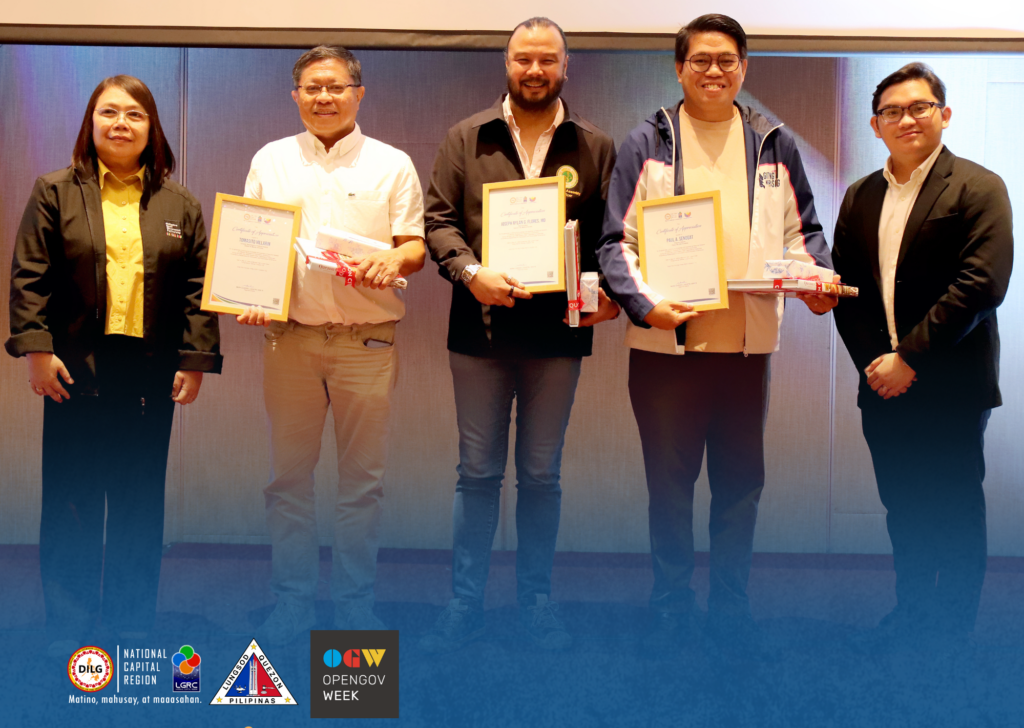
In celebration of this year’s Open Gov Week, the Department of the Interior and Local Government – National Capital Region (DILG-NCR), together with the Quezon City Open Government Partnership (OGP) Local Steering Committee, co-hosted the session titled, “Capacitate to Collaborate: Empowering Stakeholders for Participatory and Accountable Governance” on May 21, 2025, at Luxent Hotel, Quezon City.
With attendees from the Office of the City Administrator and accredited civil society organizations (CSOs) across all local government units (LGUs) in NCR, the session aimed to promote and strengthen participatory governance within the region through fostering multi-stakeholder collaboration and enhancing mechanisms for citizen engagement.
Welcoming the participants, DILG-NCR Regional Director Maria Lourdes L. Agustin, CESO III provided a brief walkthrough of the Department’s efforts to advance CSO participation in local governance processes, acknowledging the impact they bring to the local communities.
“We recognize that it is not enough to provide them a space and avenue to participate. More importantly, we need to capacitate these CSOs to help them fully participate in the co-implementation of our programs, projects, and activities,” said RD Agustin.
Starting off the discussions on effective strategies for participatory governance, Dr. Joseph Rylan G. Flores, Past President of the Quezon City Medical Society (QCMS), shared the journey of the said organization from its establishment in 1950 to becoming an LGU-accredited CSO in 2023. He also discussed the existing initiatives of QCMS in partnership with the different councils and committees of the LGU, including health, environmental and sanitation, and community development projects.
Following this, former DILG Undersecretary for Special Concerns and Informal Settler Communities Tomasito S. Villarin, who currently serves as a lecturer in the Political Science Department of the Ateneo de Manila University, underscored the importance of people’s participation in local governance as a means to address poverty. As such, he emphasized the critical role of community organizing in ensuring the genuine and active participation of poor and vulnerable communities.
Finally, Pasig City CSO Academy (PCCA) Program Director Paul A. Senogat presented the milestones achieved by the academy in line with its efforts to increase participatory mechanisms in the said locality. Specifically, he recalled PCCA’s journey to producing 270 graduates, discussed the outcomes of the CSO Congress conducted in 2023, and shared the academy’s plans to establish its own knowledge resource center.
To conclude the session, Quezon City OGP Local Steering Committee Member Tristan Joseph A. Alcantara highlighted that the discussions serve as a testament to various stakeholders’ shared commitment to advancing transparent, accountable, and participatory governance at the local level. He also reiterated Quezon City’s commitment not only to become a model city, but also to collaborate with other LGUs in pushing for more open government reforms.
In 2024, the Quezon City Government became one of the six (6) local cohorts of the Open Government Partnership, with two (2) of their commitments under their local action plan recognized as part of the Open Gov Challenge—a call to action recognizing the most ambitious flagship actions from its members.
At present, the DILG-NCR actively collaborates with the Quezon City Government to ensure the effective implementation of their local action plan and promote its best practices to encourage more NCR LGUs to become local cohorts of OGP.
